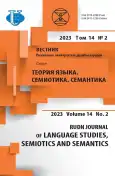Semiotic Approach in Psycholinguistics
- Authors: Nikitina E.S.1
-
Affiliations:
- Moscow Financial and Law University
- Issue: Vol 14, No 2 (2023)
- Pages: 435-445
- Section: LANGUAGE AND SOCIETY
- URL: https://journal-vniispk.ru/2313-2299/article/view/323438
- DOI: https://doi.org/10.22363/2313-2299-2023-14-2-435-445
- EDN: https://elibrary.ru/LCJJAR
- ID: 323438
Cite item
Full Text
Abstract
The study is devoted to psycholinguistics as one of the angles of the study of consciousness. The relevance of the study is due to the fact that psycholinguistics has not yet succeeded in constructing a valid ontological picture defining the specific “reality” of a given science, and finding a place for it in the scientific picture of the world. If we take into account the spatial structure of the sign, then we can assume the presence of at least three points of view on semiotics as a subject of study of the sign organization of consciousness. These are linguistic semiotics, philosophical semiotics and psychological-hermeneutical semiotics. The novelty of the study lies in the introduction of psycholinguistics into the intersubject communicative space of disciplines that study consciousness in order to highlight its subject-methodological features. The symbolic nature of consciousness makes it possible to consider semiotics not only as a scientific subject of study, but also as a method of organizing and transferring experience. As a result of the analysis of the problem, the statement can be proposed that psycholinguistics methodically explores understanding as an accompanying function of text creation. In culture, relations between people are reified, and this reification is semiotic. In the psyche, these relationships are psycholinguistic. The socio-cultural encounter of these relationships occurs at the metacognition level.
Keywords
About the authors
Elena S. Nikitina
Moscow Financial and Law University
Author for correspondence.
Email: m1253076@yandex.ru
ORCID iD: 0000-0001-6985-802X
SPIN-code: 9565-1834
PhD in Philology, Associate Professor of the Department of Journalism, Advertising and PR
17-1, Serpukhov val str., Moscow, Russian Federation, 115191References
- Semiotics. Dictionaries and encyclopedias on the Academician. (2021). URL: https://dic.academic.ru/dic.nsf/ruwiki/8181 (accessed: 01.02.2021). (In Russ.).
- Martin, Br. & Ringkhem F. (2009). Dictionary of Semiotics. Moscow: URSS. Р. 253. (In Russ.).
- Zotov, A.F. (2011). Scientific rationality: history, modernity, prospects. Questions of philosophy, 5, 5-17. (In Russ.).
- Shatin, Yu.V. (1996). Three vectors of semiotics. Discourse, 2, 41-47. (In Russ.).
- Morris, Ch. (1946): Signs, Language and Behavior. New York: Prentice Hall.
- Makhlina, S.T. (2010). Lectures on semiotics of culture and linguistics. St. Petersburg: SPbKO. (In Russ.).
- Ginzburg, C. (1989). Clues: Roots of an Evidential Paradigm. In: Clues, Myths, and the Historical Method. Baltimore: Johns Hopkins University Press. pp. 96-125.
- Nikitina, E.S. (2006). Semiotics. Course of lectures. Moscow: Academic Project; Trickst. (In Russ.).
- Morris, Ch.U. (1983). Foundation of the sign theory. In: Semiotics. Moscow: Raduga. (In Russ.).
- Lebedev, S.A. (2014). Course of lectures on the philosophy of science. Moscow. (In Russ.).
- Eko, U. (1998). Missing structure. Introduction to semiology. Moscow: Petrópolis. (In Russ.).
- Leont'ev, A.A. (1997). Basics of psycholinguistics. Moscow: Smysl. (In Russ.).
- Kassirer, E. (2002). Philosophy of symbolic forms. Moscow: Univer. kn.; SPb., Yazyk. (In Russ.).
- Averintsev, S.S. (1976). Symbol. In: Brief literary encyclopedia. Vol. 6. Moscow. P. 828. (In Russ.).
- Sapogova, E.E. (1999). Psycholinguistics for psychologists: in search of didactic paradigm. Izvestiya TulGU. Series: Problems of linguistics, 2, 63-72. (In Russ.).
- Mamardashvili, M.K. & Pyatigorsky, A.M. (1997). Symbol and consciousness. Metaphysical reasoning about consciousness, symbolism and language. Moscow: Yazyki russkoy kul'tury. (In Russ.).
- Bogin, G.I. (2001). Gaining the Ability to Understand. Introduction to Philological Hermeneutics. Moscow: Psychology and Business OnLine. (In Russ.).
- Brudnyi, A.A. (1998). Psychological hermeneutics. Moscow: Labirint. (In Russ.).
- Nikitina, E.S. (2016). Semantic analysis of the text: psychosemiotic approach. Moscow: URSS: Lenand. (In Russ.).
- Sapogova, E.E. (2006). Chronotop Bakhtina: the temptation of penetration. Cultural and historical psychology, 2(1), 94-98. (In Russ.).
- Lotman, Yu.M. (2002). Semiotics of Culture and the Concept of the Text. In: History and Typology of Russian Culture. St. Petersburg: Art. pp. 158-162. (In Russ.).
Supplementary files









